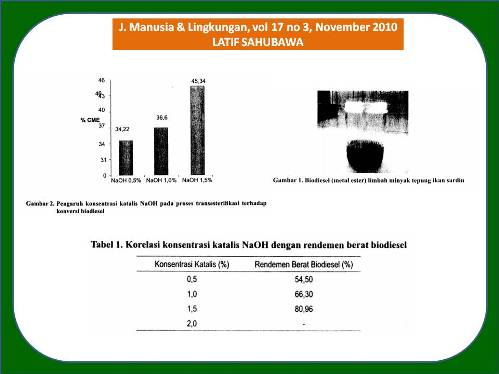
PENGARUH PENGGUNAAN KATALIS PADA REAKSI TRANSESTERIFIKASI TERHADAP KUALITAS BIODIESEL LIMBAH MINYAK TEPUNG IKAN SARDIN (The Effect of Using Catalyst in Transesterification Reaction on the Biodiesel Quality from Sardine flour Oil Waste)
Latif Sabubawa(1*)
(1) Jurusan Perikanan & Kelautan, Fakultas Pertanian UGM
(*) Corresponding Author
Abstract
ABSTRAK
Reaksi transesterifikasi pembentukan metil ester (biodiesel) dari limbah minyak tepung ikan sardin menggunakan NaOH sebagai katalis. Tujuan penelitian adalah mempelajari pengaruh konsentrasi katalis NaOH dalam reaksi transesterifikasi terhadap produksi biodiesel, konversi, dan kualitas fisik biodiesel. Variabel yang dianalisis adalah pengaruh konsentrasi katalis NaOH (0,5%, 1,0%, 1,5%, dan 2,0% dari berat total minyak dan metanol) pada tahap reaksi transesterifikasi. Hasil penelitian menunjukkan bahwa peningkatan penggunaan konsentrasi katalis NaOH (0,5% dan 1,5%), menghasilkan biodiesel (%) yang semakin tinggi. Konversi biodiesel terbesar diperoleh pada konsentrasi NaOH 1,5% (b/b), yaitu 45,34%. Komponen pada pembentukanbiodiesel adalah campuran metil palmitat (20,31%). Berdasarkan data ASTM, biodiesel yang dihasilkan memiliki kualifikasi sebagai bahan bakar diesel.
ABSTRACT
Process of the transesterification reaction of sardine flour oil waste with NaOH as base catalyst in producing biodiesel was conducted. The research purpose has studied the influence of NaOH concentration in transesterification process and examine its effect on the quality of biodiesel production, conversion, and physialc quality. The variables that analysed was the effect of NaOH concentration as catalyst (0,5%, 1,0%, 1,5%, and 2,0% from amount of oil and methanol) in the transesterification reaction step. The result showed that the increasing NaOH concentration (0,5% until 1,5%), enhanced the biodiesel conversion (%). The highest conversion of biodiesel was achieved by using 1,50% NaOH (w/w) with 45,34% biodiesel conversion. The major component in the biodiesel was methyl palmitate (20,31%). ASTM analysis data also supported that the biodiesel product was in agreement with automotive diesel fuel specification.
Full Text:
ARTIKEL LENGKAP (PDF) (Bahasa Indonesia)Article Metrics
Refbacks
- There are currently no refbacks.
Copyright (c) 2017 Jurnal Manusia dan Lingkungan







